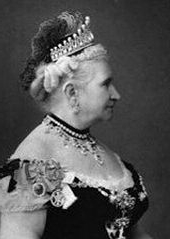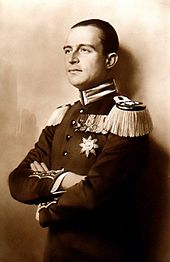Click here to go back to news page.
Grand Duke Adolf Friedrich VI
(17 June 1882 — 23 February 1918) - the last reigning grand duke of Mecklenburg-Strelitz
The memorial plaque by the river made me wonder who on earth Adolf Friedrich was (apart from being the last Grand Duke) and what the "unexplained circumstances" of his untimely death by the river might have been.

 He was brought up unhappily in the Ducal palace at Neustrelitz, which was known as an extremely formalistic and stuffy court.
After going away to study law and doing his princely stint in the army he escaped from Neustrelitz at age 20 in order to spend as much time as he could with his grandmother in England,
the formidable Augusta (Augusta Karoline Charlotte Elizabeth Mary Sophia Louise of Cambridge, to give it you in full).
She was the granddaughter of George III and Queen Charlotte, who in turn was the daughter of Duke Charles Louis Frederick of Mecklenburg-Strelitz and Prince of Mirow.
Augusta herself married the then Grand Duke Frederick William of Mecklenburg-Strelitz,
who was thus her first cousin on her mother's side and second cousin on her father's side.
Got all that? Here's a family tree to make it clearer.
Nothing like keeping it in the family.
Grandma Augusta lived an amazingly long time and was known as a shrewd but cantankerous old bat;
she was consulted about Edward VII's coronation because she could remember the coronations not only of Queen Victoria but even of William IV, 71 years earlier in 1830,
and she only missed George V's coronation in 1910 because her bath chair was in for a service that day.
He was brought up unhappily in the Ducal palace at Neustrelitz, which was known as an extremely formalistic and stuffy court.
After going away to study law and doing his princely stint in the army he escaped from Neustrelitz at age 20 in order to spend as much time as he could with his grandmother in England,
the formidable Augusta (Augusta Karoline Charlotte Elizabeth Mary Sophia Louise of Cambridge, to give it you in full).
She was the granddaughter of George III and Queen Charlotte, who in turn was the daughter of Duke Charles Louis Frederick of Mecklenburg-Strelitz and Prince of Mirow.
Augusta herself married the then Grand Duke Frederick William of Mecklenburg-Strelitz,
who was thus her first cousin on her mother's side and second cousin on her father's side.
Got all that? Here's a family tree to make it clearer.
Nothing like keeping it in the family.
Grandma Augusta lived an amazingly long time and was known as a shrewd but cantankerous old bat;
she was consulted about Edward VII's coronation because she could remember the coronations not only of Queen Victoria but even of William IV, 71 years earlier in 1830,
and she only missed George V's coronation in 1910 because her bath chair was in for a service that day.
All this meant that there was a certain amount of interest in Britain for the little towns of Neustrelitz and Mirow
(the latter is where we keep the kayaks, by the way) —
inspired by Queen Charlotte, one Thomas Nugent even published in 1766 a three-volume account of the area entitled The History of Vandalia : Containing the Ancient and Present State of the Country of Mecklenburg, Its Revolutions Under the Vandals, the Venedi, and the Saxons, with the Succession and Memorable Actions of Its Sovereigns.
Anyway, to get back to Adolf, when his father died in June 1914 he had to get back to Neustrelitz to take over as Grand Duke.
There was a lot of fuss because he was supposed to marry someone "appropriate", against his will.
There's discrete debate about whether he wanted to marry (or even already had married) someone "inappropriate" or whether he wasn't really that way inclined at all.
Grandma seems to have come to keep him company in Neustrelitz (and got rather stuck there due to the First World War), dying there in December 1916.
Just over a year later, on February 23, 1918, the Grand Duke and his dog went for an evening stroll down that track (the "old road") that we walked on 22 July.
He didn't come back.
The army and lots of locals turned out to look for him (he was quite popular locally because he'd dug up the palace gardens to grow potatos for the people of Neustrelitz during the war)
and found his dog. The next day they found him as well, in the river just at the spot where I took the river photos.
He had been shot and drowned (yes, both) and is buried at Mirow.
Although Wikipedia confidently says that the Grand Duke committed suicide,
a few things do strike you as puzzling.
They never found the gun, for instance, even though the army "searched thoroughly" for it.
Even if he'd fallen into the river holding it, surely the army would have found it, or it would have turned up later (it's a navigable canal, not a flowing river as such, so it wouldn't have been swept away).
And it's somehow hard to imagine psychologically that if he'd gone out to shoot himself he'd have taken his dog along for the walk.
The memorial plaque by the river sums it all up:
A life between duty and desire
end times and upheaval
Even in death tragic and eternal puzzle.
Click here to go back to news page.

 He was brought up unhappily in the Ducal palace at Neustrelitz, which was known as an extremely formalistic and stuffy court.
After going away to study law and doing his princely stint in the army he escaped from Neustrelitz at age 20 in order to spend as much time as he could with his grandmother in England,
the formidable Augusta (Augusta Karoline Charlotte Elizabeth Mary Sophia Louise of Cambridge, to give it you in full).
She was the granddaughter of George III and Queen Charlotte, who in turn was the daughter of Duke Charles Louis Frederick of Mecklenburg-Strelitz and Prince of Mirow.
Augusta herself married the then Grand Duke Frederick William of Mecklenburg-Strelitz,
who was thus her first cousin on her mother's side and second cousin on her father's side.
Got all that? Here's a family tree to make it clearer.
Nothing like keeping it in the family.
Grandma Augusta lived an amazingly long time and was known as a shrewd but cantankerous old bat;
she was consulted about Edward VII's coronation because she could remember the coronations not only of Queen Victoria but even of William IV, 71 years earlier in 1830,
and she only missed George V's coronation in 1910 because her bath chair was in for a service that day.
He was brought up unhappily in the Ducal palace at Neustrelitz, which was known as an extremely formalistic and stuffy court.
After going away to study law and doing his princely stint in the army he escaped from Neustrelitz at age 20 in order to spend as much time as he could with his grandmother in England,
the formidable Augusta (Augusta Karoline Charlotte Elizabeth Mary Sophia Louise of Cambridge, to give it you in full).
She was the granddaughter of George III and Queen Charlotte, who in turn was the daughter of Duke Charles Louis Frederick of Mecklenburg-Strelitz and Prince of Mirow.
Augusta herself married the then Grand Duke Frederick William of Mecklenburg-Strelitz,
who was thus her first cousin on her mother's side and second cousin on her father's side.
Got all that? Here's a family tree to make it clearer.
Nothing like keeping it in the family.
Grandma Augusta lived an amazingly long time and was known as a shrewd but cantankerous old bat;
she was consulted about Edward VII's coronation because she could remember the coronations not only of Queen Victoria but even of William IV, 71 years earlier in 1830,
and she only missed George V's coronation in 1910 because her bath chair was in for a service that day.